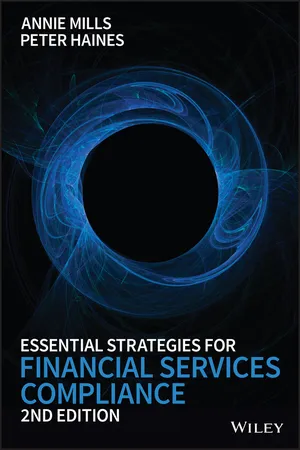
- English
- ePUB (mobile friendly)
- Available on iOS & Android
Essential Strategies for Financial Services Compliance
About this book
In recent years, not only has the compliance field become firmly established, but it has seen staggering growth, thanks to never-ending changes in the regulatory environment. As regulation increases still further, the demand for clear guidance on navigating daily compliance issues is greater than ever. Now in its second edition, the highly successful Essential Strategies for Financial Services Compliance has been updated with the latest compliance strategies and regulatory information, making it indispensable for compliance officers, legal firms, and anyone else working with the financial services compliance function.
Non-compliance represents a significant material risk for any financial services firm that fails to understand and appropriately apply regulatory standards. This Second Edition of Essential Strategies for Financial Services Compliance makes it easy to digest complex information on the regulatory framework. But this book is far from solely theoretical. A balanced approach means that both the concepts and their application are within reach. Annie Mills and Peter Haines deliver solid advice that can be applied on a day-to-day basis to manage any compliance issues that may arise. Read this book to:
- Understand the conceptual basis of compliance and the current regulatory environment applicable to the financial services industry
- Quickly and thoroughly learn the accepted best practices for everyday compliance
- Get up to date information on the current financial regulatory environment with this new edition
- Reference detailed advice as issues arise in day-to-day operations
This update to the popular first edition of Essential Strategies for Financial Services Compliance will help eliminate non-compliance risk and ensure that your firm is entirely current on its ability to navigate the maze of financial services regulation.
Frequently asked questions
- Essential is ideal for learners and professionals who enjoy exploring a wide range of subjects. Access the Essential Library with 800,000+ trusted titles and best-sellers across business, personal growth, and the humanities. Includes unlimited reading time and Standard Read Aloud voice.
- Complete: Perfect for advanced learners and researchers needing full, unrestricted access. Unlock 1.4M+ books across hundreds of subjects, including academic and specialized titles. The Complete Plan also includes advanced features like Premium Read Aloud and Research Assistant.
Please note we cannot support devices running on iOS 13 and Android 7 or earlier. Learn more about using the app.
Information
Part One
Commentary and Context
Chapter 1
The UK Regulatory Environment
1.1 Regulation in the UK
Financial Services Legislation in the UK
- UK law can be divided into two main types:
- statute law – law created through acts of parliament.
- case law or common law – law established through legal precedent developed over hundreds of years from custom, tradition and cases coming to court.
- Statute law is of most relevance to financial services although common law also has an impact through, for example, contract law in relation to loan agreements.
- A piece of statute law cannot become final until it has been agreed by both Houses of Parliament and has subsequently received Royal Assent from the Queen.
- Acts of Parliament cannot possibly contain every single detail relating to the area they govern. Consequently, secondary or delegated legislation is used to update and amend statute law without having to go through the full legislative process. This secondary legislation, referred to as statutory instruments or regulations, has the full force of law.
- As the UK is a member of the European Union, the UK government must implement EU legislation.
- The main way in which EU law has historically had an impact on UK regulation is through the implementation of the directives and regulations issued as part of the EU's Financial Services Action Plan (see Box 5 on page 343) and the Lamfalussy Process. However, EU regulation is frequently updated, such that numerous directives have been updated multiple times. CRD IV is a good example of this in the area of capital adequacy standards for financial institutions.
- Directives and regulations are pieces of EU legislation that are binding on its member states1 and on non-member states within the European Economic Area (EEA).2 Directives allow national governments certain flexibility in terms of how the end result is achieved and need to be transposed into the law of each member state whereas regulations do not require such transposition and thus apply directly to individual member states without being separately implemented in each country.
- EU law is aimed at harmonizing standards across the EEA in order to support the single market objective and the relevant directives and regulations apply across the EEA in the same way that they apply to the UK, although the extent to which they have really been implemented in letter and spirit across each member state has often been a matter of debate.
- Some pieces of legislation enacted in other jurisdictions are applied on an extraterritorial basis.
- For the financial services industry, the main pieces of relevant legislation falling into this category come from the USA.
1.2 Different Regulatory Regimes in the UK
- the FSMA regime for investment business;
- the anti-money laundering regime; and
- the takeover regime.
1.3 The FSMA Regime for Investment Business
Table of contents
- Cover
- Praise for the First Edition
- Title Page
- Copyright
- Acknowledgements
- List of Abbreviations
- Preface to the First Edition (Or, How Not to be an Execution Officer)
- Foreword to the First Edition
- Foreword to the Second Edition
- Part One: Commentary and Context
- Appendices
- Part Two: Compliance Perspectives
- Index
- End User License Agreement